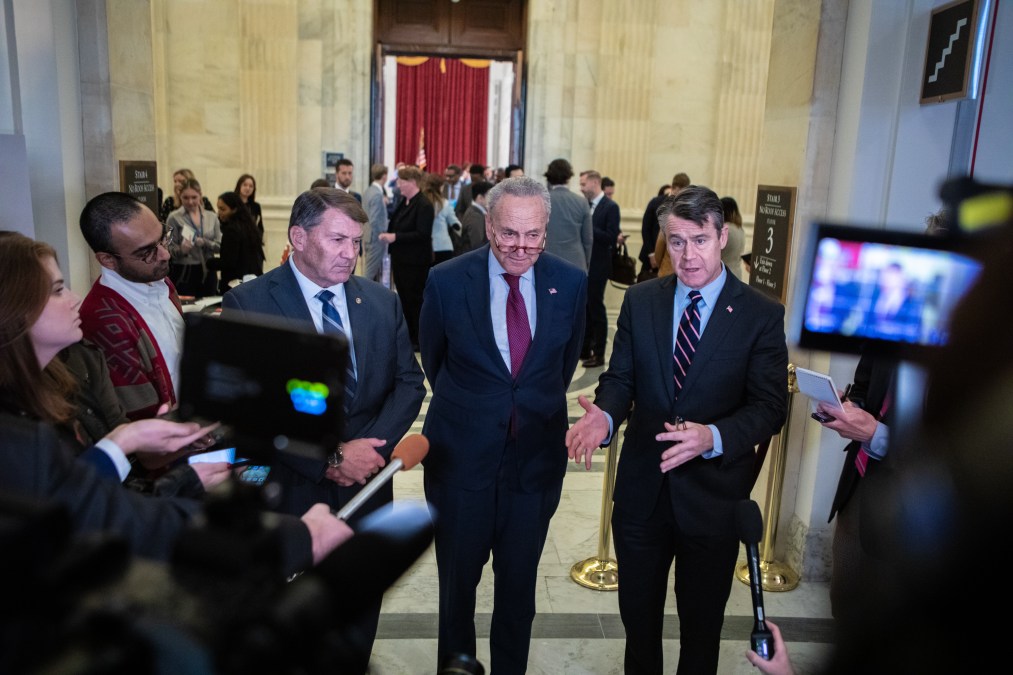Government AI funding among priorities in Senate working group roadmap

A bipartisan Senate working group focused on artificial intelligence released a policy roadmap Wednesday, highlighting multiple areas where it says there’s consensus, such as increasing federal research funding.
The roadmap outlines policy areas the working group believes “merit bipartisan consideration” and summarizes findings from that group’s insight forums held last year with AI leaders from industry, academia and advocacy groups. In addition to boosting AI spending, the report also covers deepfakes, upskilling workers, and fully funding a National AI Research Resource in its priorities.
“We hope this roadmap will stimulate momentum for new and ongoing consideration of bipartisan AI legislation, ensure the United States remains at the forefront of innovation in this technology, and help all Americans benefit from the many opportunities created by AI,” the working group members said in the roadmap.
The Bipartisan Senate AI Working Group is composed of Sens. Mike Rounds, R-S.D., Martin Heinrich, D-N.M., Todd Young, R-Ind., and Senate Majority Leader Chuck Schumer, D-N.Y. The roadmap comes as legislators in both chambers have explored myriad ways to address the risks and potential of the booming technology but haven’t yet passed broad AI legislation.
Previewing the announcement last week, Schumer said their approach isn’t to develop one comprehensive plan but rather targeted legislation that addresses specific issues. In a press conference Wednesday, Schumer said the working group’s deliberations were never meant to supplant the work of congressional committees.
“We are very, now, hopeful that the bipartisan momentum that we fostered and the recommendations we made will extend into the committees and their process,” Schumer said. “If anything is going to be accomplished, it has to be bipartisan and it’s going to be done by the committees.”
Schumer also said he plans to meet with House Speaker Mike Johnson, R-La., “in the very near future to see how we can make this bipartisan effort bicameral.”
Among the recommendations in the roadmap, the working group encouraged the executive branch and the Senate Appropriations Committee to reach “as soon as possible” the $32 billion in annual spending on non-defense AI innovation that was proposed by the National Security Commission on Artificial Intelligence in its final report.
That panel, which was made up of people from industry and academia, was tasked with making recommendations to the president and Congress on AI and issued its conclusions in 2021. At the time, their recommended investment would have doubled government research and development spending.
Lawmakers also underscored the need to fund accounts that haven’t reached their full funding potential under the CHIPS and Science Act, “particularly those related to AI.” Among the accounts the lawmakers listed was the National Science Foundation’s Directorate for Technology, Innovation, and Partnerships, which is aimed at boosting U.S. competitiveness in critical and emerging technologies through research.
Additionally, authorizing a full-scale National AI Research Resource was included as a policy priority. The NAIRR, which operates under NSF, is currently in a pilot phase and is providing access to industry and federal tools and data needed for AI research, such as access to supercomputers and generative AI models. Lawmakers and administration officials, however, have stressed the need for legislation to codify and fully fund the resource.
The roadmap was immediately met with praise and criticism Wednesday.
Linda Moore, president and CEO of TechNet, applauded the roadmap’s support for funding, including for the AI Safety Institute and legislation to authorize the NAIRR. TechNet, a network of technology CEOs and senior executives, worked to advocate for the passage of the NAIRR legislation with the bill’s House sponsor, Rep. Anna Eshoo, D-Calif., Moore said in a prepared statement.
By providing funding for those initiatives and others, “Congress will empower a new generation of AI leaders, expand innovation and opportunity beyond Silicon Valley, and keep America at the forefront of scientific development for generations to come,” Moore said.
Meanwhile, Nicole Gill, co-founder and executive director of Accountable Tech, called the roadmap “another proof point of Big Tech’s profound and pervasive power to shape the policymaking process.” Accountable Tech is an organization focused on reining in Big Tech.
Gill called the insight forums a “dream scenario for the tech industry” and alleged that companies “played an outsized role in developing this roadmap and delaying legislation.” She also said the roadmap “is most concrete in offering a roadmap for industry priorities while merely hand-waving toward many of the most pressing challenges associated with the widespread adoption of AI.”
This story was updated May 15, 2024, with comments from Schumer’s press conference Wednesday.






